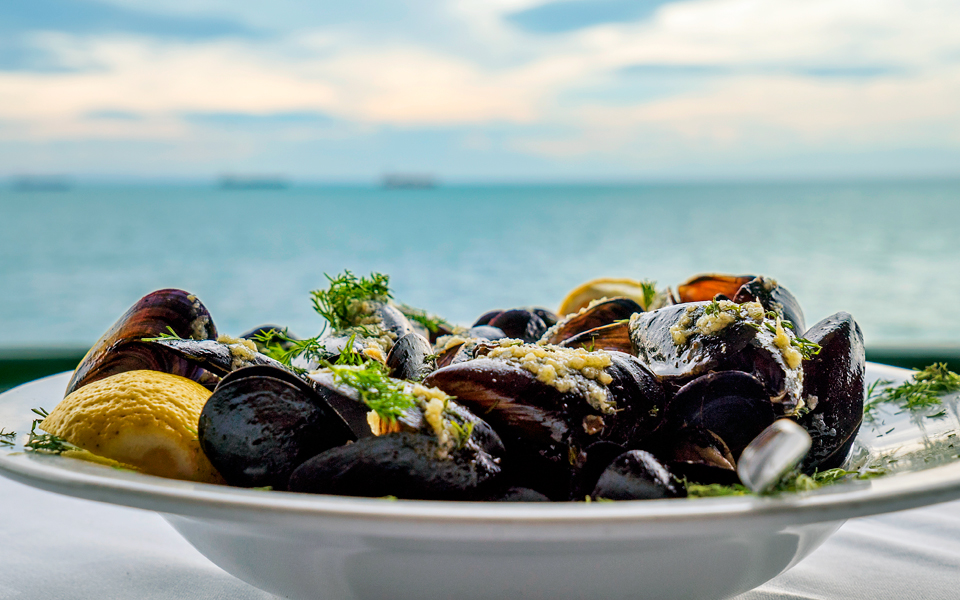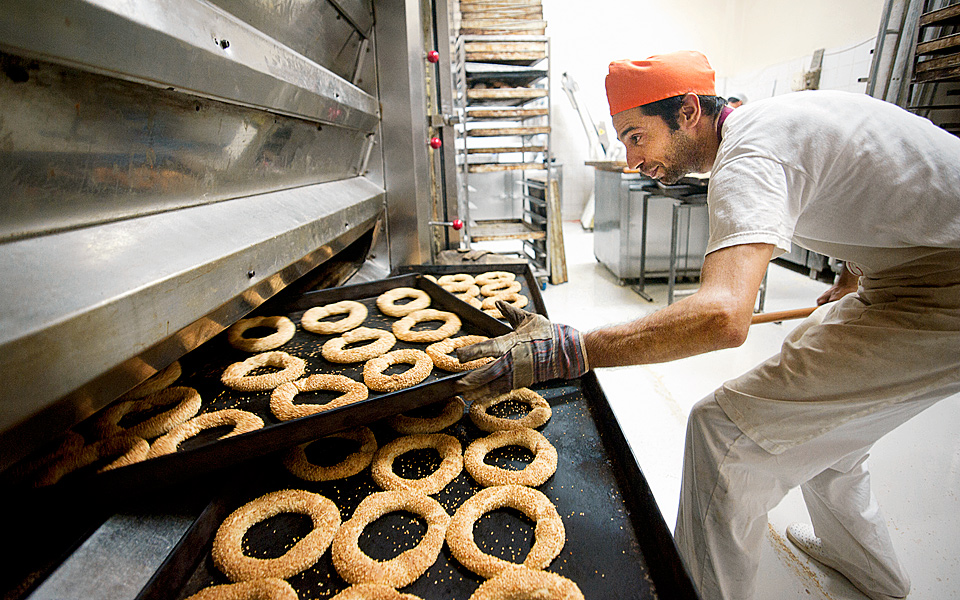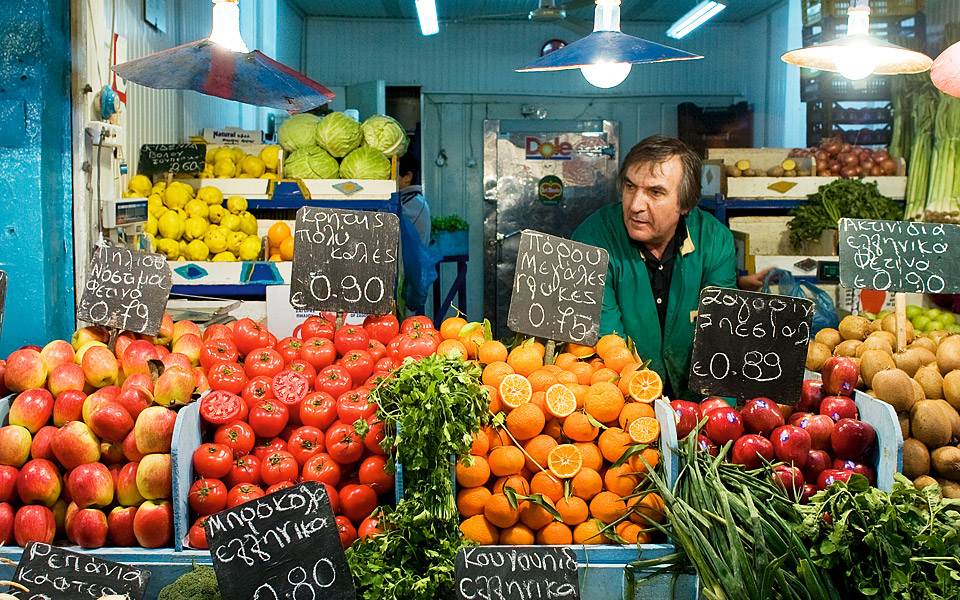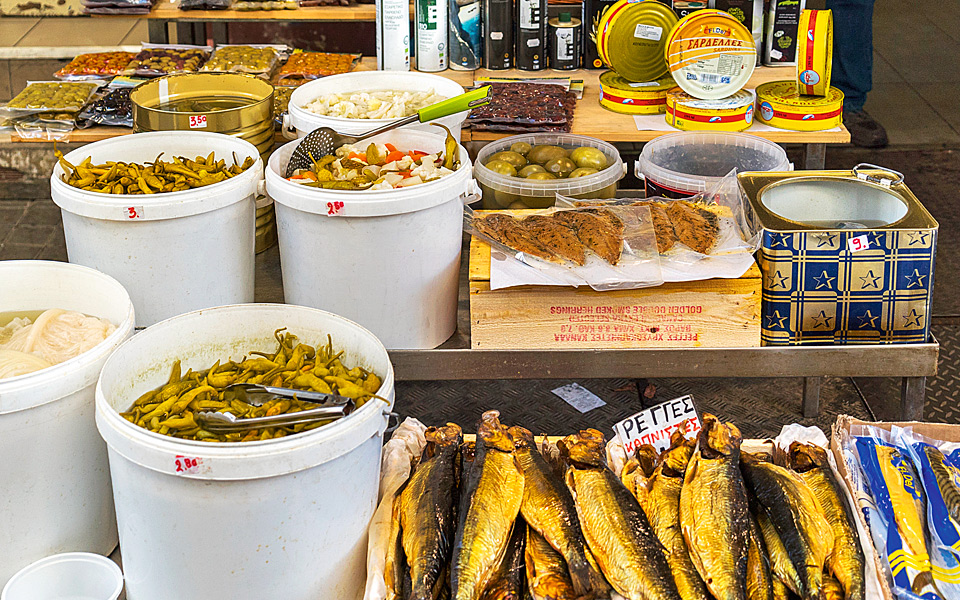Traditional Cretan Food: From Farm to Table at...
Experience Crete’s slow food philosophy where...

Cooks and waiters will tell you that the city’s reputation
as gastronomic capital is built on
a commitment to quality ingredients.
© Perikles Merakos
Eating is a serious matter in Thessaloniki. No matter where you go, from the humblest fish and chips hole-in-the-wall to the trendiest “in” restaurant, you’ll find that a meal is not something to be rushed, but rather relished and savored. The dishes may range from a simple salad of broccoli, beets and wild greens, to crisp pies oozing with creamy cheese and paper-thin slices of pastourma made from cured camel meat, sizzling fried mussels and spicy “soutzoukakia” meatballs. This ceremonial approach to food is not the exclusive domain of the leisure classes or the pot-bellied gourmand; almost all residents, be they impeccably manicured ladies, scruffy dockworkers, bearded intellectuals, suited businessmen or tattooed students, are epicures and you will often find them patronizing the same restaurants and tavernas.
Greece’s second largest city has earned a reputation as the country’s gastronomic capital not because celebrated chefs are doing great things at five-star restaurants or experimenting with ethnic fusion – though both are certainly in evidence. Instead, cooks and waiters will tell you that this reputation is built on a commitment to quality ingredients.
Almost every neighborhood has a classic family restaurant but also a plethora of lively meze establishments specializing in the “little dishes” that pair so beautifully with tsipouro or ouzo. Add to these the host of tavernas owned by the descendants of Asia Minor refugees, who inherited their grandmothers’ recipes or give them their own inventive twist; greasy spoons that stay open 24/7 serving tripe soup to early birds and night owls; homey fish places; casual grill houses and souvlaki joints. There are even atmospheric beer halls in the remodeled warehouses of the traffic-free squares and alleys of the Ladadika district, the only one to escape the Great Fire of 1917.

Established in 1935 and with two outlets in the city center, the Titania bakery is one of the key producers of Thessaloniki’s famous koulouri.
© Alexandros Avramidis
One of the best places to begin to appreciate the diversity of Thessaloniki’s food scene is Kapani, the city’s large, open-air farmers’ market. After an appetite-whetting stroll through stalls that spill over with seafood, fruit and vegetables, pickles in barrels, blocks of dazzling white feta, shiny black and green olives, pyramids of powdered red chillies and garlands of dried peppers, eggplant and tomatoes, you can indulge in an actual feast at one of the dozens of little, no-frills restaurants.
The youthful energy of students is also omnipresent. Why settle for a generic cheeseburger combo or double pepperoni pizza when you can enjoy a steaming bowl of mussels, dunking chunks of bread into the garlic, tomato and herb infused juice at the bottom, or tuck into a platter of bougiourdi, a dish of roasted cheese, tomatoes and hot green peppers, for the same price?
In Thessaloniki you can eat well without even sitting down. Its street vendors are ubiquitous, just in case you need a snack to keep you going between meals. And when their wares appear elsewhere in Greece they are advertised as “Thessalonian” as proof of authenticity. Foremost among these is the koulouri, a baked bread ring covered in sesame seeds, which comes in various degrees of chewiness and crispness, depending on whether it’s a single loop or braided. The bougatsa, another classic snack, is more filling.

Fresh fruits and vegetables don’t have to travel for days to reach market and plate in Thessaloniki, which is surrounded by farmland.
© Perikles Merakos

Pick a pickle, from fish to veg, at the open-air farmers’ market in Kapani, where you can also get a bit to eat at dozens of no-frills tavernas.
© Alexandros Avramidis
Thessaloniki’s cuisine reflects the city’s multiethnic and inclusive history. Unlike Athens, which was a remote outpost after the fall of Rome, it lay directly on the route between the West and Constantinople, between the Balkans and the Aegean, and as the second city of both the Byzantine and Ottoman empires, it accommodated conquerors and traders, settlers and itinerant merchants, from Sephardic Jews fleeing the Spanish Inquisition to Armenian and Arab traders, Slavs and Greeks from poorer rural areas. More recently, it welcomed refugees from Asia Minor, Greeks from the Black Sea and hundreds of migrants from the Balkans seeking new opportunities.
Besides endowing it with a complex human geography, Thessaloniki’s spot on the map also brings with it the bounties of nature. The city is surrounded by farmland and grazing pastures, so quality meat and dairy, fresh fruits and vegetables don’t have to travel hours to reach market and plate. The Thermaic Gulf and the sea around the Halkidiki peninsula provide abundant fish and seafood, while the river delta offers a nutrient-rich environment in which shellfish flourish.
The best places to savor fish are on the waterfront or near the port, refreshed by the sea breeze and sparkling waves. Simple or sophisticated, they serve such treats as crisp but succulent fried mussels, a revelation if you haven’t had them before, to squid lovingly filled with soft white cheese, herbs and/or rice and gently roasted; cuttlefish stewed with greens or tomatoes; and shrimp. It goes without saying that the choice of finny creatures is also vast, beginning with tiny, fried Mediterranean sand smelt and sardines, including the prized red mullet and bonito and ending with groupers, giant sea bream and monkfish.
Meat lovers will not go hungry either. Just follow your nose and the aromas of grilling skewered kebabs, gyros and kokoretsi (spit-roasted innards) will lead you to their source. Besides these Anatolian specialties, keep your eye out for whole lambs and suckling pigs slowly turning on their own spits, glistening and dripping with juices.
Visitors should take note that many eateries do not accept credit cards and almost all allow smoking.
Experience Crete’s slow food philosophy where...
A Thessaloniki expert selects 13 spots...
Souvlaki joints started appearing in earnest...
On Mykonos, this simple yet vibrant...